Vauxhall Astra vs Peugeot 508 - Differences and prices compared
Compare performance (225 HP vs 360 HP), boot space and price (25200 £ vs 44600 £) at a glance. Find out which car is the better choice for you – Vauxhall Astra or Peugeot 508?
Costs and Efficiency:
When it comes to price and running costs, the biggest differences usually appear. This is often where you see which car fits your budget better in the long run.
Vauxhall Astra has a significantly advantage in terms of price – it starts at 25200 £, while the Peugeot 508 costs 44600 £. That’s a price difference of around 19380 £.
Fuel consumption also shows a difference: Peugeot 508 manages with 1.60 L and is therefore noticeable more efficient than the Vauxhall Astra with 2.20 L. The difference is about 0.60 L per 100 km.
As for range, the Vauxhall Astra performs clearly better – achieving up to 419 km, about 364 km more than the Peugeot 508.
Engine and Performance:
Power, torque and acceleration are the classic benchmarks for car enthusiasts – and here, some clear differences start to show.
When it comes to engine power, the Peugeot 508 has a noticeable edge – offering 360 HP compared to 225 HP. That’s roughly 135 HP more horsepower.
In acceleration from 0 to 100 km/h, the Peugeot 508 is convincingly quicker – completing the sprint in 5.20 s, while the Vauxhall Astra takes 7.50 s. That’s about 2.30 s faster.
In terms of top speed, the Peugeot 508 performs minimal better – reaching 250 km/h, while the Vauxhall Astra tops out at 235 km/h. The difference is around 15 km/h.
There’s also a difference in torque: Peugeot 508 pulls evident stronger with 520 Nm compared to 360 Nm. That’s about 160 Nm difference.
Space and Everyday Use:
Beyond pure performance, interior space and usability matter most in daily life. This is where you see which car is more practical and versatile.
Both vehicles offer seating for 5 people.
In curb weight, Vauxhall Astra is distinct lighter – 1341 kg compared to 1811 kg. The difference is around 470 kg.
In terms of boot space, the Peugeot 508 offers slightly more room – 487 L compared to 422 L. That’s a difference of about 65 L.
In maximum load capacity, the Peugeot 508 performs somewhat better – up to 1537 L, which is about 198 L more than the Vauxhall Astra.
When it comes to payload, Vauxhall Astra slight takes the win – 509 kg compared to 469 kg. That’s a difference of about 40 kg.
Who comes out on top?
Overall, the Vauxhall Astra shows itself to be outperforms in nearly all aspects and secures the title of DriveDuel Champion.
It convinces with the more balanced overall package and proves to be the more versatile choice for everyday use.
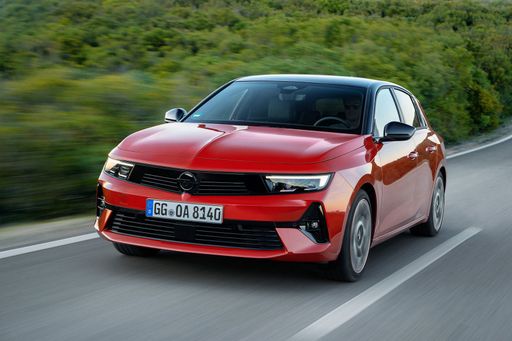
Vauxhall Astra
Costs and Consumption
View detailed analysis
Engine and Performance
View detailed analysis
Dimensions and Body
View detailed analysis
Vauxhall Astra
The Opel Astra strikes a neat balance between everyday practicality and engaging handling, so the daily grind suddenly feels a bit less dull. Inside it's intelligently packaged with modern kit and comfortable seating, making it a very sensible pick for buyers who want a dependable hatchback that doesn't take itself too seriously.
details

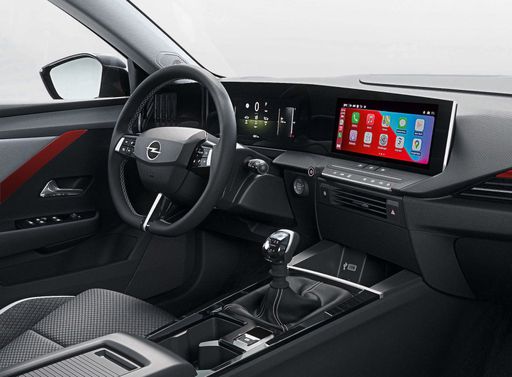
Peugeot 508
The Peugeot 508 turns heads with a low-slung, almost coupe-like silhouette and a cabin that feels grown-up and surprisingly premium for the money. On the road it balances comfort and poise with a playful edge, making it a convincing choice for buyers who want something stylish and sensible without shouting for attention.
details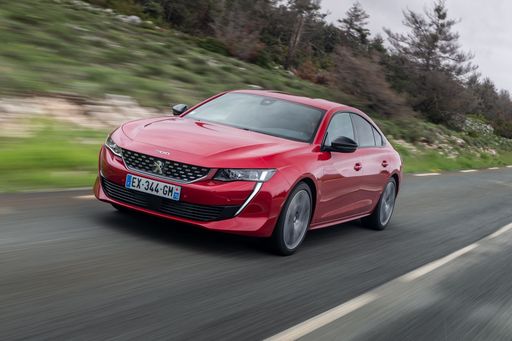
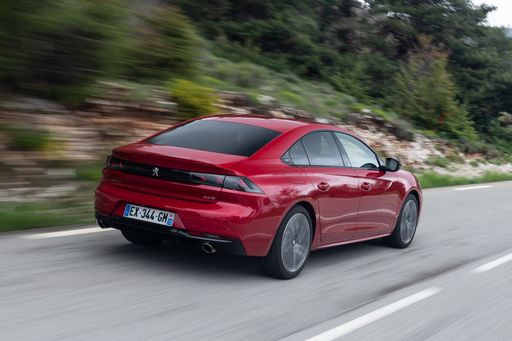
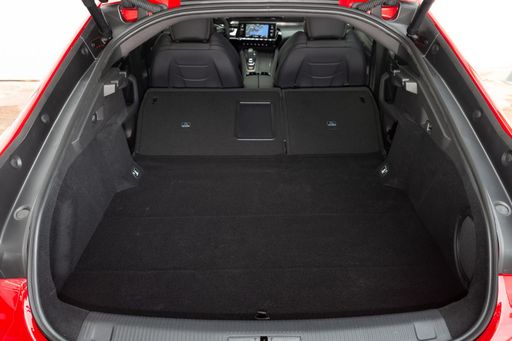
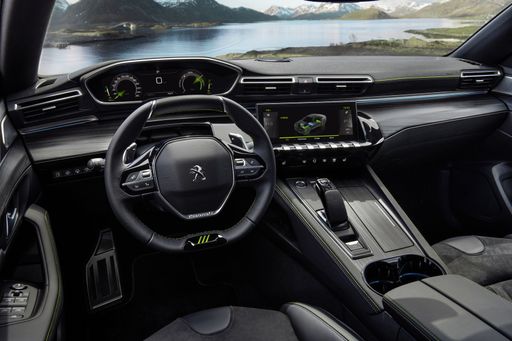
Costs and Consumption |
|
|---|---|
|
Price
25200 - 40500 £
|
Price
44600 - 60800 £
|
|
Consumption L/100km
2.2 - 6 L
|
Consumption L/100km
1.6 - 2 L
|
|
Consumption kWh/100km
15.40 kWh
|
Consumption kWh/100km
-
|
|
Electric Range
82 - 419 km
|
Electric Range
46 - 55 km
|
|
Battery Capacity
51 kWh
|
Battery Capacity
-
|
|
co2
0 - 135 g/km
|
co2
36 - 45 g/km
|
|
Fuel tank capacity
42 - 52 L
|
Fuel tank capacity
43 L
|
Dimensions and Body |
|
|---|---|
|
Body Type
Hatchback
|
Body Type
Hatchback
|
|
Seats
5
|
Seats
5
|
|
Doors
5
|
Doors
5
|
|
Curb weight
1341 - 1736 kg
|
Curb weight
1811 - 1941 kg
|
|
Trunk capacity
352 - 422 L
|
Trunk capacity
487 L
|
|
Length
4374 mm
|
Length
4750 mm
|
|
Width
1860 mm
|
Width
1859 mm
|
|
Height
1432 - 1488 mm
|
Height
1403 mm
|
|
Max trunk capacity
1268 - 1339 L
|
Max trunk capacity
1537 L
|
|
Payload
414 - 509 kg
|
Payload
379 - 469 kg
|
Engine and Performance |
|
|---|---|
|
Engine Type
Petrol, Diesel, Electric, Petrol MHEV, Plugin Hybrid
|
Engine Type
Plugin Hybrid
|
|
Transmission
Manuel, Automatic
|
Transmission
Automatic
|
|
Transmission Detail
Manual Gearbox, Automatic Gearbox, Reduction Gearbox, Dual-Clutch Automatic
|
Transmission Detail
Automatic Gearbox
|
|
Drive Type
Front-Wheel Drive
|
Drive Type
Front-Wheel Drive, All-Wheel Drive
|
|
Power HP
130 - 225 HP
|
Power HP
180 - 360 HP
|
|
Acceleration 0-100km/h
7.5 - 10.6 s
|
Acceleration 0-100km/h
5.2 - 8.2 s
|
|
Max Speed
170 - 235 km/h
|
Max Speed
230 - 250 km/h
|
|
Torque
230 - 360 Nm
|
Torque
360 - 520 Nm
|
|
Number of Cylinders
3 - 4
|
Number of Cylinders
4
|
|
Power kW
96 - 165 kW
|
Power kW
133 - 265 kW
|
|
Engine capacity
1199 - 1598 cm3
|
Engine capacity
1598 cm3
|
General |
|
|---|---|
|
Model Year
2023 - 2025
|
Model Year
2024
|
|
CO2 Efficiency Class
D, A, C, B
|
CO2 Efficiency Class
B
|
|
Brand
Vauxhall
|
Brand
Peugeot
|
What drive types are available for the Vauxhall Astra?
Available configurations include Front-Wheel Drive.
The prices and data displayed are estimates based on German list prices and may vary by country. This information is not legally binding.




